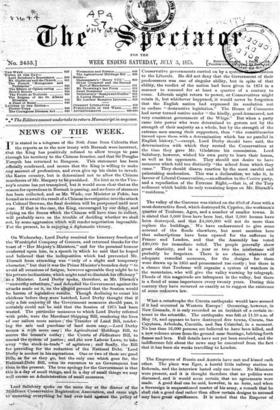Lord Salisbury spoke on the same day at the dinner
of the Middlesex Conservative Registration Association, and came nigh to recanting everything he had ever said against the policy of Conservative governments carried on by a syste tion
to the Liberals. He did not deny that the Government of their predecessors was one of singular ability, but in spite of that ability, the verdict of the nation had been given in 1874 in a manner to resound for at least a quarter of a century to come. Liberals might return to power, or Conservatives might retain it, but whichever happened, it would never be forgotten that the English nation had expressed its resolution not to endure "destructive legislation." The House of Commons had never turned restive under "the kindly, good-humoured, not very consistent government of the Whigs." But when a party came into power who were determined to govern not by the strength of their majority as a whole, but by the strength of the extreme men among their supporters, then "the constieuencies turned upon them with a determination which has no parallel in - English history,"--except, Lord Derby should have said, the determination with which they routed the Conservatives at the time they gave Mr. Gladstone his commission. Lord Salisbury, however, wished his own party to learn their lesson, as well as his opponents. , They should not desire to have measures which told too distinctly "the school from which they came." they should disarm reaction by. the most careful and painstaking moderation. This VIEW a declaration; we take it, in favour of Liberal Conserva.tifim,,an adhesion to the Centre party, and a repudiation of the Extreme Right,—that is, of the Tory sediment which builds its only remaining hopes on Mr. Disraeli's "residuum."


































